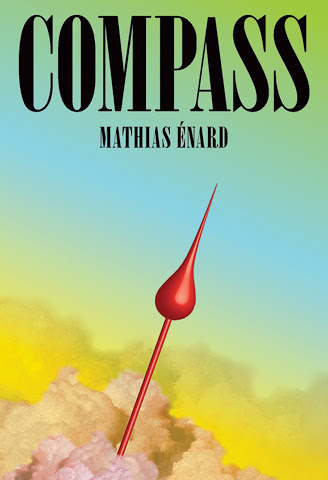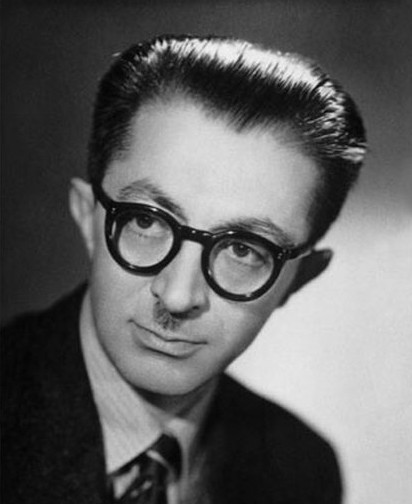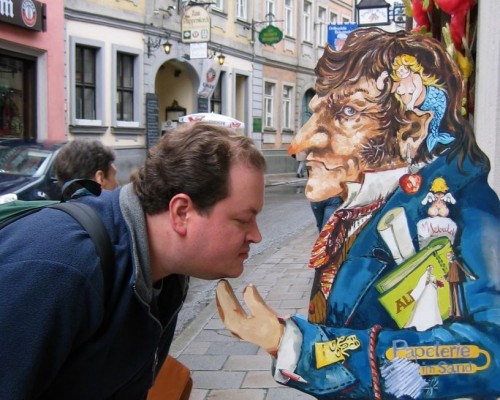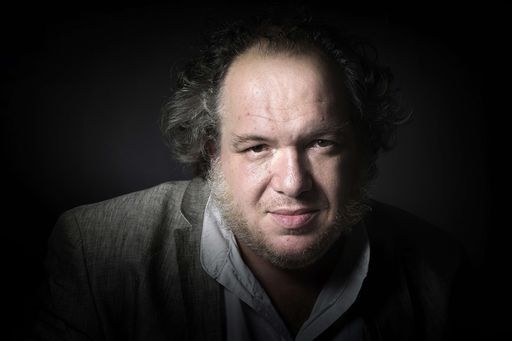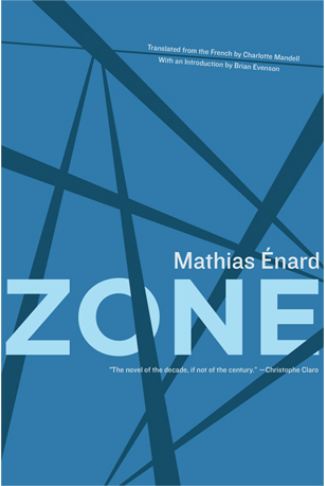When asked if Compass is a political novel, Énard replied affirmatively, but said its politics are unifying, to show our dependence on each other for growth and to emphasize the strength in great diversity. —Frank Richardson
Compass
Mathias Énard
Translated by Charlotte Mandell
New Directions, 2017
$27.95, 448 pages
.
On a drizzly December night in Vienna, a solitary man stares out his window, his agonized reflection another self with whom he feels interchangeable, as indistinct as the water molecules within a droplet condensing on the glass. The window vibrates with Shahram Nazeri singing a poem by Rumi, and the shadow self becomes interlocutor in an internal monologue that will last through a sleepless night—a night of remembrance, regrets, and desire—a night in which a dying man considers his past and present.
But Compass (Boussole)—Mathias Énard’s ninth published work and third novel to be translated into English by Charlotte Mandell; winner of the 2015 Prix Goncourt and longlisted for the 2017 Man Booker International Prize—is not only a novel of memory and identity, it is a novel that celebrates centuries of cross-cultural exchange between the East and West: a vital novel, arriving when we need desperately to be reminded of the strength in diversity, of the reason in embracing the other.
Born in 1972 in Niort, France, Mathias Énard studied Arabic and Persian languages at INALCO, has traveled widely in the Middle East, and is now a professor of Arabic at the University of Barcelona. His multi-award-winning 2008 novel Zone (reviewed by Numéro Cinq’s Mary Stein), a stream of consciousness meditation on the cycles of war, finds a perfect companion in Compass, where the interconnected lives of fictional and historical musicians, writers, explorers, and asylum seekers are woven in a great tapestry of thought, a balm for one man’s soul and an appeal for peace to all.
.
The Blind Owl
The man at the window, Franz Ritter, a forty-something professor of musicology living alone in Vienna, should be reviewing a student’s dissertation, or better yet, sleeping. But this will not be a night for sleep, even if he didn’t suffer from chronic insomnia, a symptom of his undiagnosed disease. We are plunged directly into the stream of Ritter’s consciousness and his first-person narration in a page-length sentence. The exhausted professor has received a disturbing communique from his friend Sarah, a scholar of oriental literature and a specialist, like him, on Middle Eastern culture.
Sarah, who has a “passion for monstrosities” and a “penchant for the lower depths of the soul,” has sent him an old-fashioned offprint of her most recent academic article, an article whose frightening subject Franz will spend the rest of the night contemplating. For Sarah, writing from the distant jungles of Sarawak, Malaysia, isn’t just another “orientalist” colleague, she is the unrequited love of his life.
Franz gives himself up to thinking about Sarah, whose guiding philosophy is that “there is no such thing as chance, everything is connected.” He struggles to find some significance in the article which arrived without an enclosed letter. The Sarawak article sends him to sifting through every trace of her he owns: books, photographs, academic articles, letters—all become fuel for his fervent reconstruction of his memory of her. Excerpts from this archive, printed in different fonts, are sometimes accompanied by photographs, reminiscent of the novels of W. G. Sebald.
The first excerpt from Franz’s memorabilia comes from Sarah’s doctoral thesis, Visions of the Other Between East and West. Her thesis, significantly, concerns Sadegh Hedayat and his novel The Blind Owl—a novel that inspired Compass and with which it shares many parallels. Apropos his unrequited feelings for Sarah, Franz begins reading her thesis at the opening sentence of The Blind Owl: “There are certain wounds in life that, like leprosy, eat away at the soul in solitude and diminish it.” Like Hedayat’s narrator, Ritter is ill, feverish, obsessed—a man whose only interlocutor is his own shadow. Ritter isn’t writing a story as a conscious attempt to arrive at some general conclusion, but we follow his internal monologue and thus learn his history with Sarah, his desires, his regrets, and, along the way, a vast history chronicling the interconnectedness of Eastern and Western culture.
Franz’s sleepless night takes place on December 1, 2014, in Vienna, the apotheosis of European music cities and Hugo von Hofmannsthal’s “gateway to the East.” Although the novel’s chronological time follows the course of the night and Franz never leaves his apartment, his a-chronological reconstruction of his past with Sarah ranges from their first meeting seventeen years prior in Hainfeld, Austria, to other locations and time points throughout their shared history. The cities of Paris, Vienna, Damascus, Aleppo, Palmyra, Tehran, Istanbul, and others, serve as nexuses in the web of Ritter’s recollection.
Throughout the 451-page novel, Énard uses paragraphing and chapter breaks to indicate interruptions in Ritter’s thought. Ritter periodically notes the hour, and nine of these times are labeled chapter headings: 11:10 p.m., 12:55 a.m., etc. Furthermore, as Ritter’s meditations weave through his subjects, to entertain himself he composes a whimsical, imaginary book he titles On the Divers forms of Lunacie in the Orient with subdivisions such as “Orientalists in Love” and “Encyclopedia of the Decapitated.” These pseudo-chapters serve as a second set of breaks (including a table of contents listing them); however, these divisions are only part of the stream of his thoughts and always arrive mid-sentence, although they do provide opportunities for Énard to shift the focus of Ritter’s contemplations.
Ritter displays a prodigious erudition as his thoughts glide from one subject to the next. Nevertheless, he is modest to the point of self-deprecation and disparages academics (often hilariously). Whether he’s feeling nostalgic, contemplative, or even despairing, Ritter’s tone is engaging, especially when uses the first-person plural: “let’s try to breathe deeply, let our thoughts slide into an immense white space . . . let’s mimic death before it comes.” We share his space through his thoughts; we turn the pillow with him, listen to his neighbor’s dog, read Sarah’s letters, and look at her photographs.
One of the greatest strengths of the novel is the seamlessness with which Énard effects shifting between use of the present and past tense: the present tense for when Ritter describes his puttering around the apartment and current thoughts; and the past tense which Ritter uses to narrate his recollections. Adding to the verisimilitude of a man talking to himself, his interior monologue also includes rhetorical questions that range from the mundane (“Where did I put my glasses?”) to the philosophical (“What is universal?”). Naturally, these questions often serve as segues for new associations.
The narrative is necessarily discursive in so far as the story is Ritter’s mind unleashed. But rather than an unhinged, amateur historian like the narrator of Zone, here Énard gives us a scholar with an encyclopedic knowledge of music, literature, and history. In Zone, an endless run-on sentence mimics the protagonist’s disturbed mind, and as such complements his identity, i.e. form follows function. In Compass, the style Énard chose to depict Ritter’s consciousness serves greater goals; he wants to mimic consciousness but also create a platform for illustrating the cross-cultural influences of East and West. The interior monologue of a scholar is as appropriate for the content of Compass as the interior monologue of a war criminal was for Zone.
Strict autonomous monologue—exemplified by the “Penelope” chapter of Joyce’s Ulysses—presents thought undisrupted by characters reporting their actions using action verbs and the first-person pronoun. Énard never pushes his style to such an extreme, and Ritter’s internal monologue departs from a high-mimetic mode in several ways, including Énard’s use of (mostly) conventional punctuation, Ritter declaring his perceptions and reporting past events with dialogue, and the inclusion of objective, external documents (e.g. Sarah’s texts).
Despite his insomnia, Ritter does give indications that he falls asleep, or at least enters a semi-sleep borderland where dream mingles with his conscious memory. According to Ritter’s mental state, Énard modulates the narrative distance, using more conventional syntax during Ritter’s lucid moments and fluid, run-on sentences for those times when Ritter is either in a semi-dream state or emotionally disturbed (excited or angry). The shifting between these narrative modes, especially as Ritter’s subjective recollection is shaped by his perception of objective documentation, is a tour-de-force in the representation of consciousness.
Alterity
Throughout the night, Ritter seeks refuge in music[1] and each selection triggers a new set of associations. After all, he is an expert in the history of music, and so it is not surprising that whether he hears Berlioz or Beethoven, he will know their (and everyone else’s) stories. He knows that Mozart used a Turkish march for his Piano Sonata No. 11; he knows that Goethe’s West–östlicher Divan was inspired by the poetry of Hafez; and he knows that Schubert, Mendelssohn, and Strauss (among others) composed music for Goethe’s poems.
Énard favors run-on sentences whenever Ritter becomes indignant, as he does when he thinks of Félicien David, whom he describes as the “foremost Orientalist musician, forgotten like all those who have devoted themselves to body and soul to the ties between East and West” (paralleling how Ritter sees himself):
I’ve shown that the revolution in music in the nineteenth and twentieth centuries owed everything to the Orient, that it was not a matter of “exotic procedures,” as was thought before, this exoticism had a meaning, that it made external elements, alterity, enter, it was a large movement, and gathered together among others, Mozart, Beethoven, Schubert, Liszt, Berlioz, Bizet, Rimsky-Korsakov, Debussy, Bartók, Hindemith, Schönberg, Szymanowski, hundreds of composers throughout all of Europe, over all of Europe the wind of alterity blows, all these great men use what comes to them from the Other to modify the Self . . .
Alterity, otherness, is a concept Énard introduces conceptually on the first page with Franz confronting his reflection in the rain-soaked window, and a few pages later, specifically, in the excerpt from Sarah’s thesis. The relationship between oneself and the other—the central theme of the novel—emerges repeatedly though the patterns of interconnected musicians and writers, through the histories of Franz and Sarah, and through Sarah’s articles and Franz’s preternatural memory. Énard continually circles back to this concept, giving textual realization to Sarah’s philosophy of interconnectedness.
Occasionally there is a storm of references and Ritter will meditate on a dozen or more historical characters in the span of a page. For example, on a single page we learn of Joseph von Hammer-Purgstall’s attending a soiree in Vienna, hosted by Antoine and Thérèse Apponyi—friends of Chopin, Liszt, Sand, Balzac, Hugo, and Lamartine—at which Beethoven plays as Europe celebrates peace after the exile of Napoleon, whose army stormed the Orient beyond the Balkans:
Knowledge rushes behind the soldiers and the merchants, into Egypt, India, China; texts translated from Arabic and Persian begin to invade Europe, Goethe the great oak started the race; long before Hugo’s Les Orientales, at the very time Chateaubriand was inventing travel literature with his Itinerary: From Paris to Jerusalem, as Beethoven is playing that night for the little Italian countess married to a Hungarian surrounded by the finest costumes in Vienna, the immense Goethe is putting the final touches on his West-östlicher Divan, directly inspired by the translation of Hafez that Hammer-Purgstall published . . .
Such barrages of names and works are not the norm, and Ritter’s associations usually move at a less frenzied pace. But it is these associations that make the novel more than just a catalogue of facts. The philosophical and moral foundation of the novel—specifically articulated through Sarah’s guiding mantra—is that everything is connected in a meaningful way; that without the one, you would not have the other. Énard presents Compass as a metaphor itself—the story as a compass with which to get our bearings, and if the needle seems to spin at times, it should only serve as further reminder that regardless of the direction in which we look, everything and everyone is connected.
One the many pleasures in reading the novel is discovering (or rediscovering) new writers and musicians. Ritter’s description of the premiere of Félicien David’s symphony Le Désert, for example, traces its immediate influence:
The desert invades Paris—“by unanimous opinion, it was the most beautiful storm music had ever produced, no maestro had ever gone so far,” Théophile Gautier writes in La Presse, describing the storm assailing the caravan in the desert; it’s also the premiere of the “Danse des almées,” the Dance of the Almahs, an erotic motif whose subsequent fortune we know, and surprise of surprises, the first “Chant du muezzin,” the first Muslim call to prayer that ever sounded in Paris: “It’s at that morning hour we hear the voice of the muezzin,” Berlioz writes in Le Journal des débats on 15 December, “David limited himself here, not to the role of imitator, but to that of simple arranger; he erased himself completely to introduce to us, in its strange nudity and even in the Arabic language, the bizarre chant of the muezzin . . .”
Comparisons of Compass with The Thousand and One Nights and with Proust (and Ritter thinks about both) are not only inevitable, but necessary. And some historical figures you might assume should be present—Khayyam, Rumi, T. E. Lawrence—all have their place. But Énard excels in his revelation of the unexpected: musicians like Félicien David and his student Francisco Salvador-Daniel, the influential diplomat and translator Joseph von Hammer-Purgstall, or the journalist and explorer Annemarie Schwarzenbach (one of Sarah’s heroes and whom her character parallels).
 Raymond Bonheur, Félicien David, c. 1835
Raymond Bonheur, Félicien David, c. 1835
Where East Meets West
When Franz opens Sarah’s thesis at the novel’s beginning, we hear in Sarah’s voice what could serve as a prologue for Compass:
we propose to explore this crevice, to go look inside the cleft, to enter the drunkenness of those men and women who have wavered too much in alterity; we are going to take the little man by the hand to go down and observe the gnawing wounds, the drugs, the elsewheres, and explore this between-space, this bardo, this barzakh, the world between worlds into which artists and travelers fall.
In Zone, Énard used a train trip for his frame story to explore history, much as W. G. Sebald used a walking tour of England or Claudio Magris[2] a boat ride down the Danube. Here, Franz’s delving through his collection of Sarah’s writings is the framework for Énard’s excursions into the links between East and West. These authors all share an exceptional talent for storytelling and revealing, with a poet’s voice, the history of people and place.
While Compass is not plot-driven in a conventional sense, Franz’s retelling of his relationship with Sarah is a compelling narrative, complete with its own mysteries: Why is he so ashamed? Do they have a sexual relationship? What is the nature of Sarah’s enigmatic Sarawak article? Considering Franz’s discursiveness, these questions are like a Javier Marías mystery, namely it’s about the journey, not the destination, although the destination will unify and underscore the novel’s intricate image patterns.
Sarah is Franz’s idée fixe, his emotional compass—she gives him direction. How ironic then, that she gifts him an actual compass, a reproduction of one owned by Beethoven, but with a flaw—it’s designed to point east. Metaphorically, Franz is to Sarah as West is to East. He is marooned in the west, in Vienna, famous as a central hub for the Orient Express, while Sarah recedes ever farther to the east, to India and Malaysia. The name “Ritter” is German for “knight,” and Énard conceived of a medieval romance for the two. Franz’s quest is for Sarah, his unreachable love; hers is for “a long road to the East . . . ever further towards the Orient in search of something indefinable.” When he remembers their time in Aleppo—a painful memory that fuels his feelings of shame—he thinks:
Time has reasserted its power over the Sissi House; the Baron Hotel is still standing, its shutters closed in a deep sleep, waiting for the throat-slitters of the Islamic State to make it their headquarters, transform it into a prison, a fortress, or else blow it up: they’ll blow up my shame and its ever-burning memory, along with the memory of so many travelers, dust will settle again over Annemarie, over T. E. Lawrence, over Agatha Christie, over Sarah’s room, over the wide hallway (geometrically patterned tiles, walls painted in high-gloss cream); the high ceilings will collapse onto the landing where two great cedar chests rested, coffins of nostalgia with their funereal plaques, “London-Baghdad in 8 Days by Simplon Orient Express and Taurus Express,” the debris will swallow up the pompous staircase I climbed on a sudden impulse fifteen minutes after Sarah decided to go to bed around midnight: I can see myself knocking on her door, a double wooden door with yellowing paint, my fingers right next to the three metal numbers, with anxiety, determination, hope, blindness, the tightness in the chest of one who is undertaking a great endeavor, who wants to find the being guessed at under a blanket in Palmyra in an actual bed and pursue, hang on, bury himself in oblivion, in the saturation of the senses, so that tenderness will chase away melancholy and greedy exploration of the other opens the ramparts of the self.
This passage shows how Ritter’s thoughts flow from current events to historical figures to the specific memory of his anxious sexual overture; the refrain of the relationship between the self and the other frames the memory. The Baron Hotel is now a refugee shelter and the Zenobia Cham Palace Hotel in Palmyra (another significant location of the novel) and the nearby 2,000-year-old Temple of Bel, once viewable from its terrace, have been destroyed.
§
Porochista Khakpour writes in her introduction to The Blind Owl, “we are taught to read a novel all over again—in its pages there exists a collection of codes, variants, repetitions, cycles . . . .” Such is the case with Compass. As dawn approaches, Franz reads an account he wrote of his and Sarah’s time in Tehran and the story of Sarah’s thesis advisor, Morgan. Morgan’s story is also a tale of unrequited love and serves as a mirror for Franz. Franz describes the process of rereading himself as a strange sensation, and he is “attracted and repulsed by this former self as by another.” He concludes that “Being exists always in this distance, somewhere between an unfathomable self and the other in oneself.” As a unifying dual concept for the novel, alterity means not only seeking an understanding of others, but of the other in ourselves.
East and West are words of convention and it seems archaic today to speak of an Orient and an Occident. Besides, every country has its own idea of “east.” Of course, such divisive denominations persist, somewhat out of convenience perhaps, but surely also from our natural tendency to separate ourselves into families, groups, tribes, and nations. When asked if Compass is a political novel, Énard replied affirmatively (WDR), but said its politics are unifying, to show our dependence on each other for growth and to emphasize the strength in great diversity.
At his lowest, Ritter despairs of the human condition: “The human species isn’t doing its best these days,” now when the “stench of stupidity and sadness” are omnipresent. But, when have we ever done our best? During the Renaissance? The Enlightenment? We’ve always burned people alive, beheaded them, gassed them, and Énard doesn’t fail to remind us. Ritter’s despondency notwithstanding, the novel offers the opposite message: that cultural diversity stimulates great art and music and literature; and that, despite our exceptional talent for butchering one another, we also help one another, and we learn from one another.
Compass is dedicated to the people of Syria.
—Frank Richardson
N5
Frank Richardson lives in Houston and received his MFA in Fiction from Vermont College of Fine Arts. His poetry has appeared in Black Heart Magazine, The Montucky Review, and Do Not Look At The Sun.
- Compass is a music-lover’s delight with over forty references to specific works. Fitzcarraldo Editions assembled a playlist available here: Compass playlist.↵
- ]Franz and Sarah argue about the “Austro-centrism” of Danube.↵

